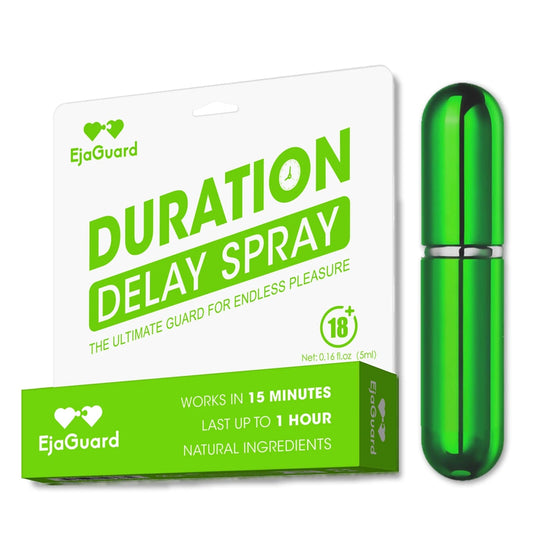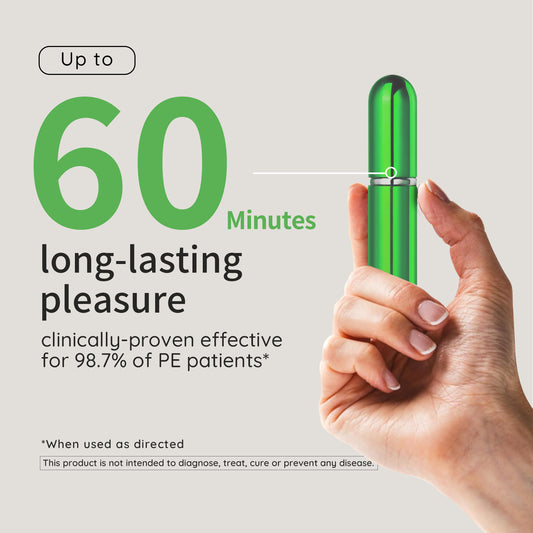Sexual health and activity are vital components of human well-being. However, as people age, their sexual health and desire can evolve due to a variety of factors, such as hormonal changes, health conditions, and lifestyle choices.
Many people wonder, at what age do people stop having sex? This article will explore when couples typically stop having sex, what affects sexual function and desire, and how men and women experience changes differently. We will also provide helpful advice on maintaining a fulfilling sex life well into older years.

Maintaining a healthy lifestyle is crucial for sexual health. You can read more about supporting sexual well-being in our EjaGuard Blog.
When Do People Stop Having Sex?
A common question many couples ask is, at what age do couples stop having sex? It’s important to note that there is no fixed age. Some people continue to enjoy active, fulfilling sex lives well into their 70s and even 80s, while others may experience a decline in sexual activity earlier due to various factors.
Studies have shown that sexual activity tends to decrease as people age, but this doesn’t mean that people stop having sex altogether. In fact, many people remain sexually active throughout their lives if their physical health and sexual function are maintained.
Studies have found that sexual activity often continues well into older years, even among those in their 70s and 80s.
Factors Affecting Sexual Desire and Function
As we age, certain physical and psychological changes can impact sexual desire and sexual function. For both men and women, the decline in testosterone levels is a key factor in changing sex drive. Testosterone is a critical hormone for sexual health. As levels decrease with age, many people experience a reduced desire for sex, which can lead to a decrease in sexual activity.
In men, a condition like erectile dysfunction (ED) can also contribute to a loss of sexual confidence and a reduced level of sexual activity. Erectile dysfunction can be caused by various factors, including poor cardiovascular health, stress, or low testosterone levels.
For women, vaginal dryness becomes a significant issue. As estrogen levels drop with age, particularly during and after menopause, many women find that vaginal lubrication is insufficient, leading to discomfort during sex. This physical change can decrease sexual desire and activity.
For those facing issues like vaginal dryness, our range of EjaGuard lubricants can provide relief and support better intimacy.

Health Conditions That Impact Sex Lives
Health conditions can significantly influence a person’s sexual function and overall sex lives. One common factor is high blood pressure, which can affect sexual health in both men and women. For men, high blood pressure can lead to erectile dysfunction, while for women, it can reduce arousal and lubrication.
Other conditions, such as diabetes, obesity, and depression, can also impact sexual desire and function. These conditions can cause physical discomfort or psychological barriers that affect intimacy. It’s important to manage these health conditions proactively to avoid their negative impact on sexual activity.
For men experiencing erectile dysfunction, products like EjaGuard Orgasm Gel might help enhance sexual experience and address related concerns.
How Men and Women Experience Changes Differently
While both men and women face changes in their sexual function and desire for sex as they age, the nature of these changes differs. For men, testosterone levels naturally decline starting in their late 20s and continue to decrease as they age. This can lead to a lower sex drive and even conditions like erectile dysfunction in men in their 40s or later. However, it’s important to note that not all men will experience these issues, and lifestyle changes or medical interventions can help alleviate symptoms.
For women, the changes associated with aging are often more dramatic due to menopause. After menopause, vaginal dryness becomes more prevalent, and sexual desire may decrease due to hormonal shifts. However, many women report a change in sexual interest after menopause, with some saying they experience less anxiety and more freedom in their sexual expression.
Research suggests that menopause significantly impacts women’s sexual health.

Maintaining a Fulfilling Sex Life Into Older Years
One of the key concerns for older adults is how to maintain a fulfilling sex life as they age. It is certainly possible to have a satisfying and active sex life later in life, even as hormonal and physical changes occur. Here are some strategies for maintaining sexual health:
- Regular exercise: Engaging in physical activity helps maintain a healthy body, which in turn supports a healthy sex life. It can boost circulation, improve hormone balance, and promote overall well-being.
- Healthy eating: A balanced diet rich in nutrients supports hormone levels, boosts energy, and promotes good cardiovascular health—all factors that contribute to sexual function.
- Managing stress: Psychological factors, such as stress and anxiety, can significantly impact sexual desire and function. Practicing relaxation techniques, such as meditation or yoga, can help.
- Communication: Open discussions about desires, needs, and concerns with a partner can strengthen emotional intimacy and improve sexual satisfaction.
- Medical treatments: If issues like erectile dysfunction or vaginal dryness arise, medical treatments and over-the-counter products like lubricants, sprays, or even hormone therapy can provide relief.
What Age Do Men Stop Being Sexually Active?
One of the most frequently asked questions is, at what age do men stop being sexually active? While aging affects every individual differently, research indicates that many men in their 40s or 50s experience a drop in sexual desire due to decreasing testosterone levels or the onset of conditions like erectile dysfunction.
However, this doesn’t mean they stop being sexually active. Many men maintain a satisfying sex life well into their 60s and 70s, especially if they take steps to support their physical health. Regular physical activity, a balanced diet, and medical intervention can all help preserve a healthy sex drive.
For men experiencing a drop in sexual desire, consider exploring options like EjaGuard Delay Spray or EjaGuard Masturbators to maintain sexual satisfaction.

How to Keep Sexual Function at Its Best as You Age
To maintain sexual function as you age, consider these practical tips:
- Exercise regularly: Cardiovascular health plays a critical role in sexual function. Regular exercise improves blood flow, which is crucial for erectile function and overall sexual health.
- Eat a nutritious diet: Foods rich in antioxidants, omega-3 fatty acids, and vitamins can help support hormonal balance, promote circulation, and keep your immune system strong.
- Stay hydrated: Proper hydration is key to maintaining vaginal lubrication in women and preventing vaginal dryness.
- Avoid smoking and excessive alcohol: Both smoking and excessive alcohol intake can impair sexual function and decrease libido. Reducing or eliminating these habits can improve sexual health.
- Consult a doctor: If you experience symptoms of erectile dysfunction, vaginal dryness, or other sexual health issues, seeking medical advice early can help address these concerns before they become bigger problems.
Conclusion
In conclusion, while sexual desire and activity tend to evolve as people age, it’s important to note that most individuals do not stop having sex entirely. The decline in sexual function and desire for sex can be influenced by many factors, including hormonal changes, physical health, and lifestyle choices. With proper care, communication, and medical support, it is entirely possible to maintain a fulfilling sex life throughout the years.
For more advice on maintaining a healthy sex life, the World Health Organization provides resources on aging and sexual health
 Buy Now
Buy Now



